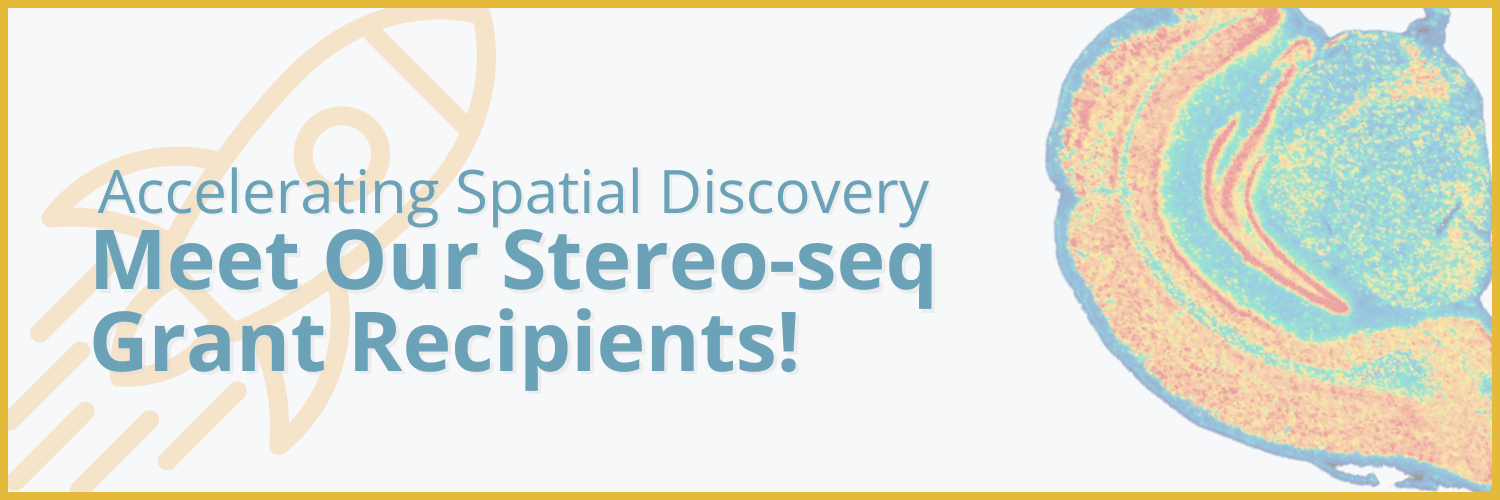Admera Health Announces Winners of Stereo-seq Grant Program with Complete Genomics to Advance Spatial Transcriptomics Research
Admera Health is dedicated to empowering researchers with cutting-edge tools and expertise to advance their next-generation sequencing initiatives. Pushing the boundaries of what’s possible in next-generation sequencing, spatial biology is transforming our understanding of cellular function with greater precision than ever before. Stereo-seq provides a novel solution that enables researchers to gain unbiased whole transcriptome profiling at high resolution and large field of view for diverse tissue types and sizes. This species-agnostic workflow supports diverse spatial transcriptomics projects and provides cutting-edge results for researchers to accelerate their studies. As a certified service provider for the technology, Admera Health ensures the highest level of precision and care for every project.
We recently awarded grants to exceptional researchers as part of our Stereo-seq grant program in partnership with Complete Genomics to accelerate spatial transcriptomics from diverse research topics and sample types. Recipients were selected from a competitive pool of applicants from Maryland, Washington DC, Pennsylvania, New York, and Delaware with awards valued up to $13,000 based on scientific impact and creativity. We proudly recognize our six recipients and share their contributions with our community.
Meet Our Recipients
Zehuan Liao, PhD
Occupation: Research Fellow
Affiliation: Johns Hopkins University School
of Medicine
Lab: The Li Lab
Dr. Liao investigates the impact of gene mutations on human health using genetically engineered human induced pluripotent stem cell (iPSC) and mouse models. His current research focuses on the molecular mechanisms of spinocerebellar ataxia type 12 (SCA12), a neurodegenerative disorder linked to CAG repeat expansion mutation in the PPP2R2B gene. Recently, Dr. Liao 's work has produced compelling preliminary evidence highlighting metabolic dysregulation in cortical brain regions of SCA12 models, establishing a solid framework for understanding the role of cortical metabolic dysregulation in SCA12 pathogenesis. Building upon this foundation, his ongoing work aims to explore the underlying mechanisms of cortical metabolic dysregulation in SCA12 pathogenesis and suggest novel therapeutic interventions targeting these pathways. This line of inquiry not only addresses critical gaps in our understanding of SCA12 but also holds potential to inspire broader therapeutic strategies for related neurodegenerative diseases.
Carolina Duque
Occupation: MD/PhD Student
Affiliation: Johns Hopkins University School of Medicine
Lab: The Mugnier Lab
Carolina is an MD/PhD student in the Pathobiology program with a strong interest in understanding the host-pathogen interactions underlying parasitic infections. Her current research focuses on elucidating the role of the immune response in the pathogenesis of Chagas cardiomyopathy (CCC), a chronic heart condition caused by the parasite Trypanosoma cruzi. Specifically, she aims to investigate how the immune system contributes to the development and progression of cardiac fibrosis and tissue damage in CCC compared to other forms of non-
Chagas cardiomyopathy.
Justin Frere, PhD
Occupation: MD/PhD Student
Affiliation: Icahn School of Medicine at Mount Sinai
Lab: tenOever Lab
Justin is an MD/PhD student in the tenOever lab at the Icahn School of Medicine at Mount Sinai, where he investigates the pathogenesis of systemic viral infections with a focus on therapeutic development. Prior to joining Mount Sinai, Justin gained valuable research experience in immunology and host-pathogen interactions. His current research aims to advance our understanding of how insect vectors, such as mosquitoes, respond to the arboviruses they transmit and studying strategies to control the spread of
these pathogens.
Shuo Xiao, PhD
Occupation: Assistant Professor
Affiliation: Rutgers University
Lab: Xiao ReproHealth Laboratory
Dr. Shuo Xiao is an Associate Professor in the Department of Pharmacology and Toxicology at the Ernest Mario School of Pharmacy and Principal Investigator of the Xiao ReproHealth Lab. The Xiao lab’s primary research explores female reproductive biology, medicine, and toxicology. Their research focuses effects of environmental contaminants on women’s reproductive health, developing novel birth control pills for women, engineering an ovary-on-a-chip and female reproductive system on-a-chip, and exploring women’s reproductive diseases like premature ovarian failure and PCOS.
Alana Benn, M.S.
Occupation: Graduate Assistant
Affiliation: Penn State Medical School
Lab: The Paul Lab
The Paul Lab at Penn State College of Medicine focuses on understanding the molecular and cellular basis of neuronal identity, a crucial aspect of brain function. Their research primarily focuses on how neuronal identity arises during development, varies in different physiological and pathological states, and is impacted by aging.
Their research aims to enhance our understanding of brain function and dysfunction in
neurological disorders.
Thank You to All Our Applicants
We thank all applicants for their time and thoughtful submissions. Your dedication to advancing spatial transcriptomics research is commendable, and we're excited about the potential of your work. We look forward to the opportunity to collaborate with transformative individuals to drive innovation in this field.
Future Opportunities
Stay tuned, we anticipate similar grant programs in the future. To receive the latest updates on future grant programs and other special news and offers, feel free to sign up for more communications.






